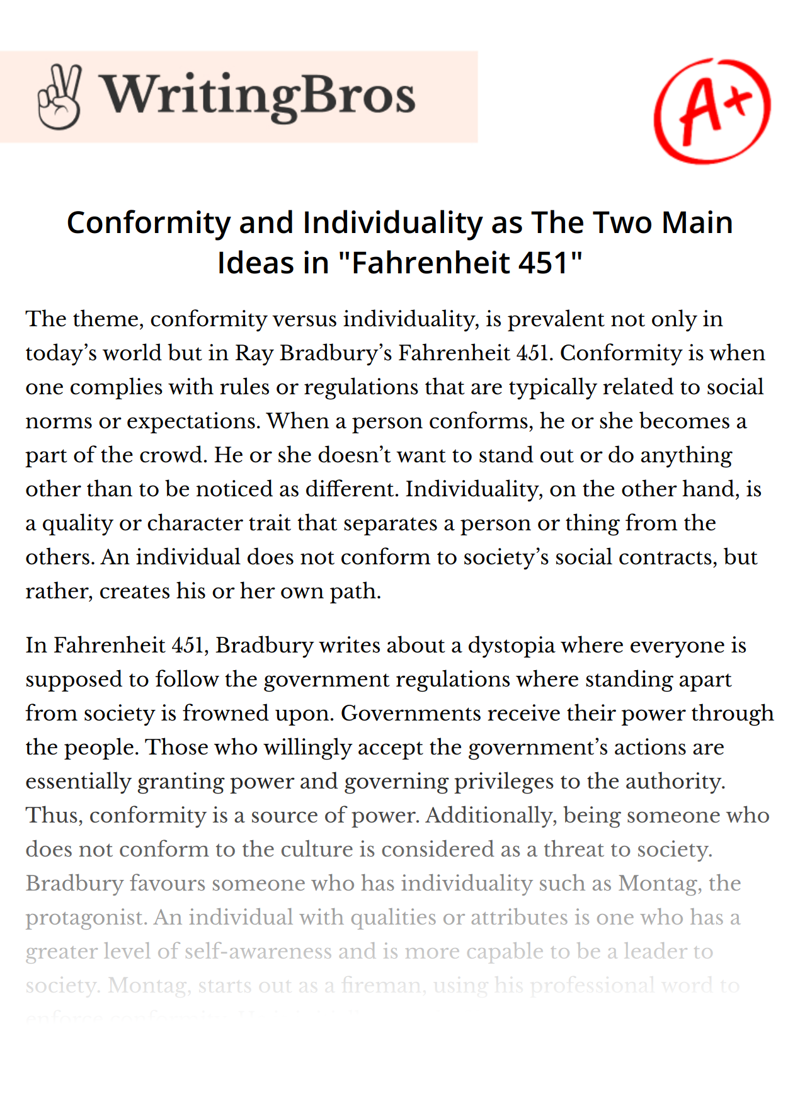Conformity and Individuality as The Two Main Ideas in "Fahrenheit 451"

The theme, conformity versus individuality, is prevalent not only in today’s world but in Ray Bradbury’s Fahrenheit 451. Conformity is when one complies with rules or regulations that are typically related to social norms or expectations. When a person conforms, he or she becomes a part of the crowd. He or she doesn’t want to stand out or do anything other than to be noticed as different. Individuality, on the other hand, is a quality or character trait that separates a person or thing from the others. An individual does not conform to society’s social contracts, but rather, creates his or her own path.
In Fahrenheit 451, Bradbury writes about a dystopia where everyone is supposed to follow the government regulations where standing apart from society is frowned upon. Governments receive their power through the people. Those who willingly accept the government’s actions are essentially granting power and governing privileges to the authority. Thus, conformity is a source of power. Additionally, being someone who does not conform to the culture is considered as a threat to society. Bradbury favours someone who has individuality such as Montag, the protagonist. An individual with qualities or attributes is one who has a greater level of self-awareness and is more capable to be a leader to society. Montag, starts out as a fireman, using his professional word to enforce conformity. He is initially proud of his career and loves burning books. But as he meets Clarisse McClellan, latent dissatisfactions soon emerge. She and her family are non-conformists who walk and enjoy nature and conversations rather than relying on technology that is the norm in their society. “We have a record on her family. We’ve watched them carefully. Heredity and environment are funny things. You can’t rid yourselves of all the odd ducks in just a few years. The home environment can undo a lot you try to do at school” (Bradbury 57). As Beatty further states, nonconformity is unacceptable due to government regulations.
Mildred Montag, in contrast, is the picture of conformity, with her Cartoon Clown, shows and her countless “friends” on the tv screens, but early in the novel the emptiness of this life drives her to attempt suicide, and later, her fear of not conforming throws her back on vacuous television watching. In this society, books are banned because they are the threat of complex thinking, the threat that everyone won’t walk in lockstep but will disagree, argue, and challenge each other. The government fears this will lead to social breakdown. Bradbury favors the society of people like the McClellan’s and their old-fashioned world of interaction, human relationships, and being in touch with nature. He enjoys reading books and contributing to self-conscious thinking. The point of the novel by Bradbury is to urge people to develop their individuality.
The government in Fahrenheit 451 wanted people to conform because it’s much easier to control people who are doing what the power group wants them to do. Controlling individuals is much harder than controlling a group. From Clarisse McClellan, early in the story, we learn about the government’s desire for everyone to conform. “I’ve got to go to see my psychiatrist now. They make me go. I made up things to say. I don’t know what he thinks of me. He says I’m a regular onion! I keep him busy peeling away the layers” (Bradbury 20). She informs Montag that she is forced to go to a psychiatrist because she would rather wander by herself among nature than hang out with kids her age and participate in their activities. Beatty also brings this idea out when he is talking with Montag the day he stays home from work. Beatty says that society doesn’t want to offend anyone, so books were made politically correct, thus making everything bland and neutral. That blandness led to conformity.
In the society of the novel Fahrenheit 451, individuality produced conflict. Clearly, the government tried its best to demolish any individual who attempted to disobey the law. Individuality was not accepted in the novel because it gave people the ability to question certain actions that were not right. Everyone lived off conformity, people were not supposed to question what they thought. Clarisse states to Montag that people did not quite seem to talk about anything interesting. The government encourages people to all do the same things; engage in the same activities. Anyone different was cast out of society. In the 1950’s it was easier to be bland and blend in than to be an individual and speak out. Bradbury addresses this issue with the book and shows the dangers of this type of thinking.
Cite this Essay
To export a reference to this article please select a referencing style below

